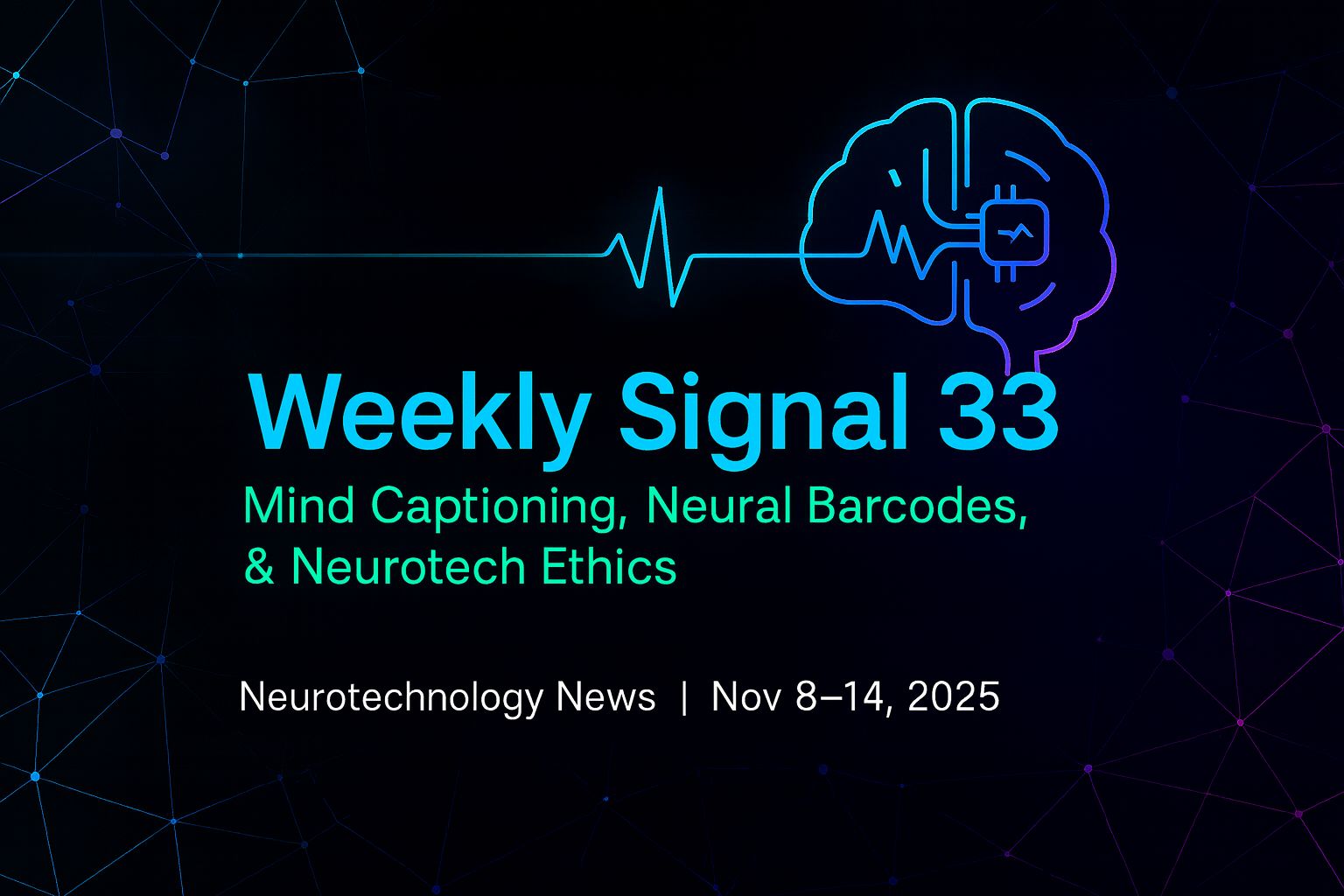Table of Contents
🧠 Weekly Signal
BCI, psychedelics, and sleep tech
Neurotechnology News | November 8–14, 2025
Let's cut through the noise this week!
This week, we saw noninvasive brain–computer interfaces move from image decoding to full-sentence “mind captioning,” and early human data on LSD microdosing for depression. Meanwhile, neuromodulation companies raised targeted capital to commercialize sleep apnea devices, as UNESCO’s new neurotechnology ethics framework entered into force. Bottom line: decoding, modulation, and governance all tightened their grip on the neurotech stack.
🧠 SCIENCE & CLINICAL TRIALS
🟢 “Neural barcodes” predict cognition and substance-use traits from resting-state fMRI
Published: November 14, 2025
Read more ➡️ Medical Express
A Nature Human Behaviour study analyzed resting-state functional MRI from over 30,000 people, showing that region-specific temporal dynamics—“neural barcodes”—predict cognitive ability and substance-use risk. The method identifies stable, person-specific activity patterns without requiring task-based paradigms.
💡 Big Picture: These findings point toward scalable, passive biomarkers that could inform personalized screening or closed-loop neuromodulation systems.
🟢 LSD microdosing shows sustained antidepressant signal in open-label trial
Published: November 12, 2025
Read more ➡️ Medical Express
An open-label Phase IIa trial (n=19) tested twice-weekly lysergic acid diethylamide (LSD) microdoses for eight weeks in major depressive disorder, reporting a 59.5% mean reduction in Montgomery–Åsberg Depression Rating Scale (MADRS) scores, sustained at six-month follow-up. The regimen (≈6–20 µg SL per dose) was feasible with no serious adverse events and only one withdrawal for anxiety, with extensive ECG and echocardiography monitoring showing no clinically significant cardiac changes.
💡 Big Picture: These data add an early but quantifiable antidepressant signal for supervised, low-dose psychedelic protocols, sharpening the case for randomized, controlled Phase IIb trials rather than purely anecdotal microdosing narratives.
🟢 “Mind captioning” decodes visual thoughts into text from fMRI
Published: November 8, 2025 (news); November 7, 2025 (paper)
Read more ➡️ Medical Express / Science
Researchers introduced a “mind captioning” decoder that uses functional MRI and deep generative models to translate visual and imagined scenes into structured text descriptions, without relying on the brain’s language network. Trained on paired image–brain data, the model produced multi-word captions that captured semantic content and relational details (e.g., actions, objects) from both viewed and recalled stimuli with high alignment between predicted and ground-truth text embeddings.
💡 Big Picture: This work pushes noninvasive brain–computer interfaces beyond category labels toward rich semantic read-out, intensifying both clinical opportunities for locked-in patients and debates about mental privacy thresholds.
💼 INDUSTRY & STARTUPS
🟢 Nyxoah raises up to $77M to launch Genio sleep apnea neurostimulator in US
Published: November 13–14, 2025
Read more ➡️ GlobeNewsWire / Yahoo Finance
Nyxoah announced a financing package totaling up to $77 million for its Genio hypoglossal nerve stimulation system for obstructive sleep apnea, combining a €17M private placement, a $5.6M registered direct offering, and up to €45M in convertible bonds. Proceeds are earmarked for US commercialization post–Food and Drug Administration approval, additional clinical data generation, Genio system redesign for manufacturability and cost, and broader R&D and corporate purposes.
💡 Big Picture: This raise signals continued investor confidence in implantable and minimally invasive neuromodulation for sleep disorders, and sets up Genio as a more serious competitor in the hypoglossal neurostimulation market.
🏛️ POLICY & ETHICS
🟢 UNESCO’s global “Ethics of Neurotechnology” framework enters into force
Published: November 8, 2025 (Update)
Read more ➡️ UNESCO
UNESCO’s General Conference adopted the first global Recommendation on the Ethics of Neurotechnology, a non-binding instrument that became effective November 12 and sets principles on mental privacy, cognitive liberty, bodily integrity, and non-discrimination. The framework calls on 194 member states to regulate riskier applications (e.g., coercive or military use, opaque brain data markets) while promoting equitable access, clinical safety standards, and redress mechanisms for harms.
💡 Big Picture: This recommendation will likely become a reference point for national neurotech laws, investor due diligence, and institutional review, raising the bar on transparency, consent, and limits to intrusive neural data use.
🎯 Community Challenge
Ready to take neurotech to the next level? Share your insights, projects, ideas, our upcoming list of NeuroHacks, or your own groundbreaking work—and watch the inspiration ripple across the community!
How to Participate
Follow HackTheNeuron
Create a Post
Show us what you’re working on—DIY projects, research breakthroughs, or even your latest neurotech musings.Use #Neurotech
This helps your ideas reach fellow enthusiasts and potential collaborators.Mention @HackTheNeuron
Tag us directly in your post so we never miss your entry—and we’ll amplify your work across our entire NeuroCircuit community!
Why Join?
Boost Your Reach: Tap into a niche but fast-growing community for extra visibility.
Build Your Network: Connect with researchers, developers, and curious tinkerers who share your passion.
Shape Neurotech’s Future: Your project or insight could spark the next big breakthrough—or inspire someone else’s.
We can’t wait to see your creativity in action! Fire up X, LinkedIn, Facebook, Instagram, or TikTok, and spread the word. Let’s spark innovation together!
🚀Recruit More Neurohackers
Your referrals are the engine that drives our community forward. Share your unique referral link with friends, colleagues, or fellow neurotech enthusiasts—and watch us grow together!
Spread the Word: Copy your personal referral link and post it on social, forums, or in emails.
Unlock Exclusive Perks: Every friend who subscribes through your link brings you closer to special rewards—insider insights, private Discord access, early project previews, and more.
Be the Catalyst: The more you share, the stronger our network becomes. Help us build the ultimate neurotech hub—one referral at a time!
✍️Help Us Improve
Your input is what will make The NeuroCircuit and Hack The Neuron better. Let us know what you’d like more of—and what we can do differently.
Share Your Ideas: Tell us which topics, features, or formats you’d love to see next.
Spot the Gaps: Let us know if anything’s missing or unclear in our content and community tools.
Shape the Experience: Whether it’s new challenges, tutorials, or platform features, your suggestions guide our roadmap.


